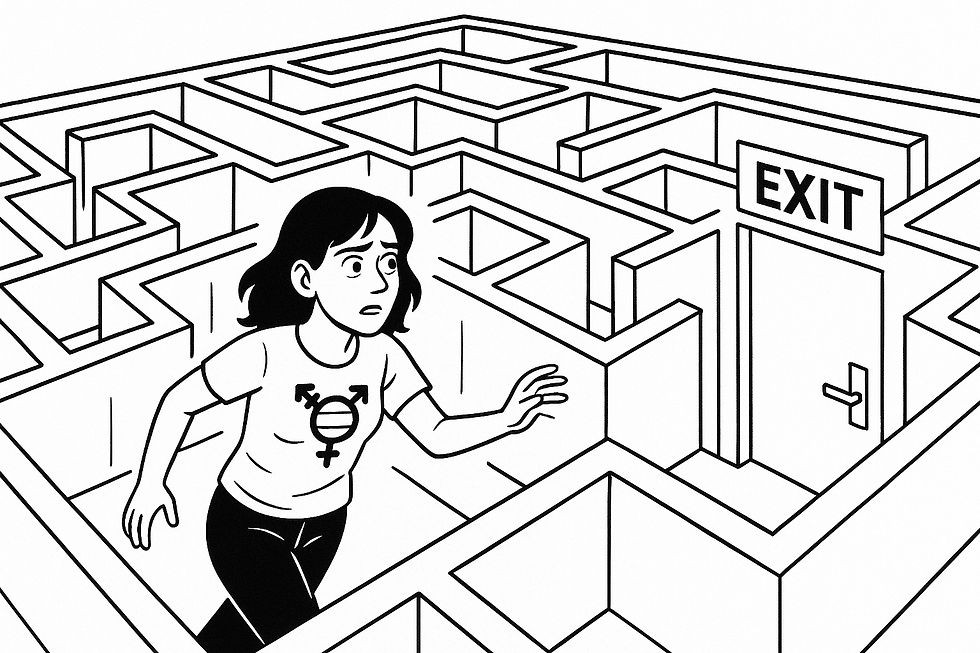What Does It Feel Like to Be Trans?
- River Champeimont
- Aug 13, 2025
- 4 min read
Updated: Aug 17, 2025
I’m sharing some intimate feelings about what it’s like to be trans “from the inside.”
The Strange
I’ve reached the point where looking at pre-transition photos doesn’t even feel like I’m looking at myself. If the pictures are from early in my transition, they feel more like, “Okay, I can tell that’s me, but you’ve only just started transitioning.” But pre-transition photos just feel like they’re pictures of someone else entirely. I know logically they’re of me, but they look like they could be of a relative. I look older (even though I’m actually younger in them), I look unattractive, and worst of all, I look like a man! Overall, it’s as if someone had put a curse on me to make me look like a completely different person—or like seeing myself in a funhouse mirror at an amusement park.
The Fear
Sometimes I wonder, “What if I was wrong?” about transitioning. I’ve gone so far—changing my appearance, my reputation, my legal identity. But then I ask myself: “Do I want to look like I did before?” “Do I want people to call me he/him?” “Do I want my old name?” The answer is obviously no. I don’t want any of those things.
The truly terrifying thought is: what if I had never realized I needed to transition? Would I have slowly sunk into despair from the growing dysphoria as I lost my androgyny with age? Would I have tried to bury those feelings by chasing something else?
No one should have to endure being trans without knowing it. I wouldn’t wish that on my worst enemy.
I sometimes wonder if some transphobes are actually trans themselves. Statistically, some must be. It must be awful to know—consciously or not—that the only way out of your misery is to embrace the very thing you’ve committed yourself to fighting. Maybe, in that case, you never find the exit.

The Surprisingly Not Strange
By society’s standards, I know I have a strange body. In either a men’s or women’s changing room, my body wouldn’t match what people expect—I have an androgynous body now, with both a penis and breasts. When I go to a swimming pool, I use the women’s changing room and wear women’s swimsuits, partly because it’s generally not acceptable to show breasts in public, but also because it simply feels right.
Day to day, though, it doesn’t feel awkward at all. I’m used to seeing myself this way, and it doesn’t bother me. In fact, I like my androgynous body. It’s just amusing to remember that it’s unusual compared to most people. Naked photos of me from before my transition, on the other hand, feel absolutely disgusting—that contrast only reminds me how much I truly love my current androgynous body.

The Amazing
The most amazing thing about transitioning is that I can behave in a way that feels natural—being “sillier” or more vulnerable, for example, than I ever was before. It might sound strange that I now feel allowed to do things I couldn’t before, but that’s the reality. You might not notice it day to day, but our society is still deeply gendered. We may have moved past openly misogynistic ideas like “some jobs are for men and others for women,” but the way we interpret behaviour is still very tied to gender. When people see you as a man, they make you feel odd or out of place if you act in ways that are culturally read as “feminine.”
Of course, you might be reading this and thinking that, for you, your own gender feels completely arbitrary. That’s a valid experience too—some non-binary people feel that way, and it’s called being agender.
For many of us, though, being seen as our true gender—the one we transition to—means we can finally express our personality without distortion. Trans people often say, “I can finally be myself.” It may sound like a cliché, but in my own experience, it’s absolutely true.

The Unchanged
And finally, some things don’t change with transitioning. I still enjoy the same hobbies: programming, electronics, anything related to electricity. I still love playing Descent II (a “boys’” game) and driving long distances. Some of these activities are more common among men in Western society, but they aren’t inherently “masculine.”
Transitioning isn’t about becoming a caricature and giving up hobbies you enjoy just because they’re typically seen as “masculine” (or “feminine” for trans men). Sometimes, trans people do feel freer to explore interests associated with their “new” gender after transitioning—but that’s usually because they weren’t allowed, or didn’t feel comfortable, exploring them before due to social pressure (for example, ballet for a boy or car tuning for a girl). In my case, that didn’t happen at all. I still enjoy exactly the same things I did before.
Conclusion
Being trans is a strange experience, and many of the specific feelings that come with it are hard to relate to if you’re not trans yourself. But when I talk to other trans women, I’m often surprised by how much we have in common. We’ll find ourselves saying things like, “Wait, you did that too?” or “I felt exactly the same!” It’s a remarkably universal experience—full of variations, of course—but one shared within a very specific part of the population.

PS: I had a lot of fun using ChatGPT to create those silly images.




Thanks River for helping Cis people to (try to) understand how essential and deep the feelings of Trans persons are 😍